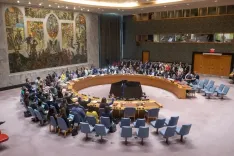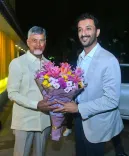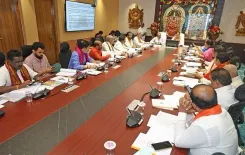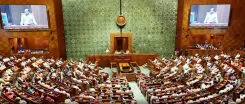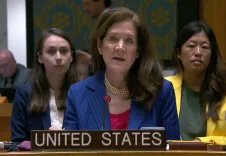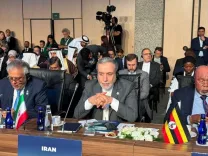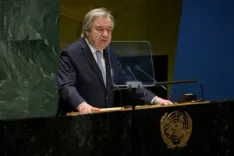Why is Former Congress Leader Arvind Netam Engaging with the RSS?
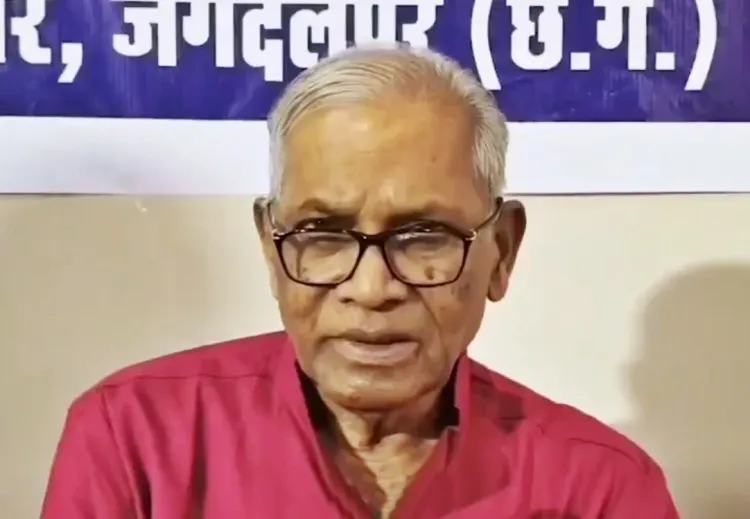
Synopsis
Key Takeaways
- Arvind Netam is a prominent tribal leader from Chhattisgarh.
- He has been invited as the chief guest by the RSS for an important event.
- Netam emphasizes the challenges faced by tribal communities.
- He perceives his role as a social worker rather than a politician.
- His insights could influence future collaborations between tribal leaders and organizations.
Raipur, June 1 (NationPress) Arvind Netam, an esteemed tribal leader from Chhattisgarh and a former Congress stalwart, is back in the news. At 83 years old, he has received an invitation from the Rashtriya Swayamsevak Sangh (RSS) to serve as the chief guest at the concluding ceremony of “Karyakarta Vikas Varg Dwiteeya,” which is set to take place on June 5, 2025, in Nagpur.
Netam will share the stage with RSS Sarsanghchalak Dr. Mohan Bhagwat. This invitation was announced on the RSS's official X account. As a veteran leader hailing from Bastar, he has observed the evolving political terrain since the era of economic reforms began.
In an interview with IANS, he described his current life phase as one of retirement, believing that little can be accomplished to improve the lives of tribal people within the existing political system.
His presence at the RSS event is perceived as part of a broader initiative by the organization to deepen its relations with tribal communities.
Throughout his career advocating for tribal welfare, Netam has largely distanced himself from active politics. Although his interactions with the RSS have been occasional, he acknowledges their acknowledgement of his efforts.
He views his participation in the event not as a political maneuver but as an opportunity to contribute as a social worker. Nevertheless, he feels that the RSS has yet to fully comprehend the complexities surrounding tribal regions.
There are still gaps in their approach. His attendance at this event signifies a pivotal moment in the developing relationship between tribal leadership and the RSS, prompting questions about potential collaborations and ideological transformations.
He explained that when tribal leaders approached concerns with the BJP, they found it more effective to engage with the RSS, even though their initial interactions were limited.
When asked about his conversations with RSS chief Dr. Bhagwat, Netam relayed that he attempted to convey how the organization was failing to understand the depth of tribal issues.
He expressed disappointment at the absence of alternative organizations that can properly address such social concerns.
“Unlike political parties, at least the RSS engages in some level of thought on the matter,” he noted, suggesting they seemed partially convinced.
In Nagpur, he plans to voice his views regarding the challenges confronting tribal populations. Netam emphasized that although he has stepped back from active political engagement, his contributions have been acknowledged by the RSS, which is how he interprets the invitation.
He believes that despite the presence of many influential thinkers, the RSS has yet to fully grasp the issues affecting tribal communities. He states that they sometimes overlook critical aspects of tribal existence. The pressing concern today, he asserts, is the detrimental effects of liberalization, initiated in 1991, on tribal populations.
He warns that the exploitation of natural resources by dominant governments, irrespective of political affiliations, will escalate, with Bastar serving as a prime example of the impending crisis.
Reflecting on past experiences, he recalled the establishment of the Panchayats (Extension to Scheduled Areas) Act (PESA) in 1996.
Bureaucrats treated it as a mere formality, pushing for its passage without fully understanding its importance. He mentioned that some well-meaning officials sought his guidance on key issues.
While state administrations were quick to adopt the Act, its fundamental purpose—protecting tribal rights—was generally overlooked.
Issues such as displacement, access to water, forests, and land remain neglected, resulting in irreversible harm. Netam expressed profound disappointment in rehabilitation efforts, stating that no displacement project has been successfully implemented, leaving affected communities unheard.
No matter which government is in power, the plight of displaced communities remains unchanged. Despite numerous laws being enacted, constitutional violations continue, and no government truly adheres to them.
Netam articulated that he perceives himself as a social worker, feeling he has no further role in politics. Had he remained with the Congress, his approach to societal issues would have been much clearer. In retrospect, he believes he may have been naive in his expectations.
Addressing the anti-LWE drive, Netam revealed that he had been outspoken on the subject since 1980. Over the years, interactions have diminished, and the Indian government has taken a firm stance, claiming credit for addressing the issue.
The political dynamics between the “Left and Right” influenced the Central government's firm position. While actions have been taken, he cautioned that ignoring the issues would be a grave mistake.
He witnessed firsthand how they were treated during his tenure. As long as Maoists remain active, they will be used as a justification for further exploitation.
He questioned what comes next, noting that no one is seriously addressing displacement, healthcare, and other urgent issues. The government's approach lacks urgency, permitting problems to escalate. Currently, the presence of one lakh paramilitary forces in Chhattisgarh ensures that resource exploitation continues.
Reflecting on his life, he acknowledged the obstacles he faced in attempting to bring critical issues to light. Without intervention, he believes the situation would have worsened.
He argued that tribal struggles have never been genuinely understood, and no government has ever elucidated the origins of LWE.
He recalled visiting affected regions where officials dismissed concerns, reacting casually even when confronted with serious grievances. When asked what key points he plans to discuss with the RSS in Nagpur, Netam identified corruption as the most significant challenge. He remarked that finding a resolution is extraordinarily difficult globally.
He cited late Prime Minister Rajiv Gandhi’s observation that out of every hundred rupees allocated, only fifteen reach the intended beneficiaries.
This issue persists, and despite numerous discussions, no government has taken substantial steps toward a resolution. Problems such as religious conversions, displacement, and ineffective law enforcement continue to afflict society. He believes a fundamental shift in people's thinking is necessary.
In response to speculation stemming from the invitation about whether he might join the BJP in the future, Netam dismissed the idea.
At 84 years old, he considers his political journey complete. His public service has transitioned into social work, and he no longer harbors any ambitions.
He stated that he has played his part, and now there is nothing left for him to pursue. His interest in political matters has waned. His profound understanding of tribal issues is rooted in decades of experience, including his time as a parliamentarian in P.V. Narasimha Rao’s government.
He previously served as the Minister of State for Education and Social Welfare in Indira Gandhi’s cabinet from 1973 to 1977 and later held the role of Minister of State for Agriculture from 1993 to 1996 under Narasimha Rao.

